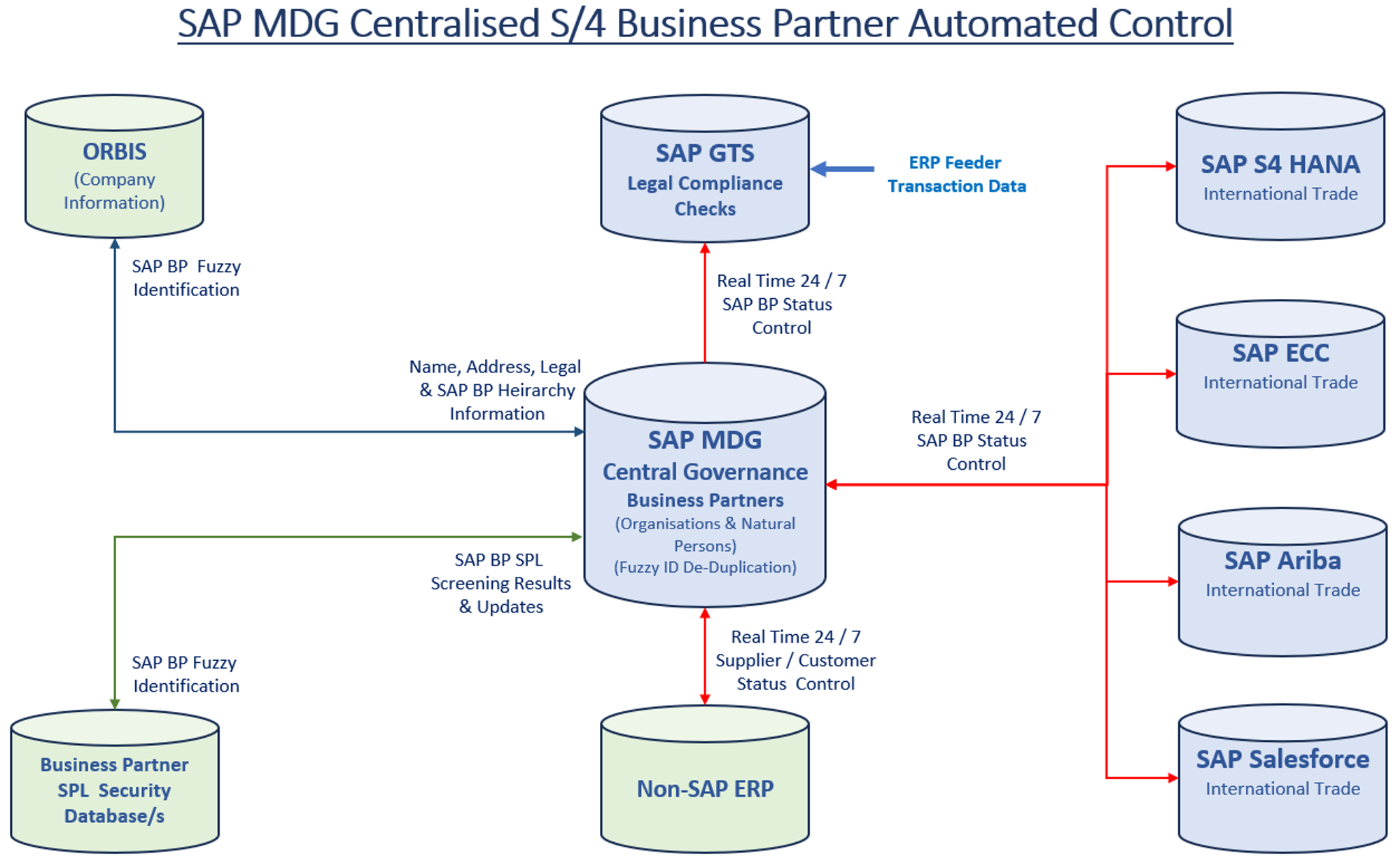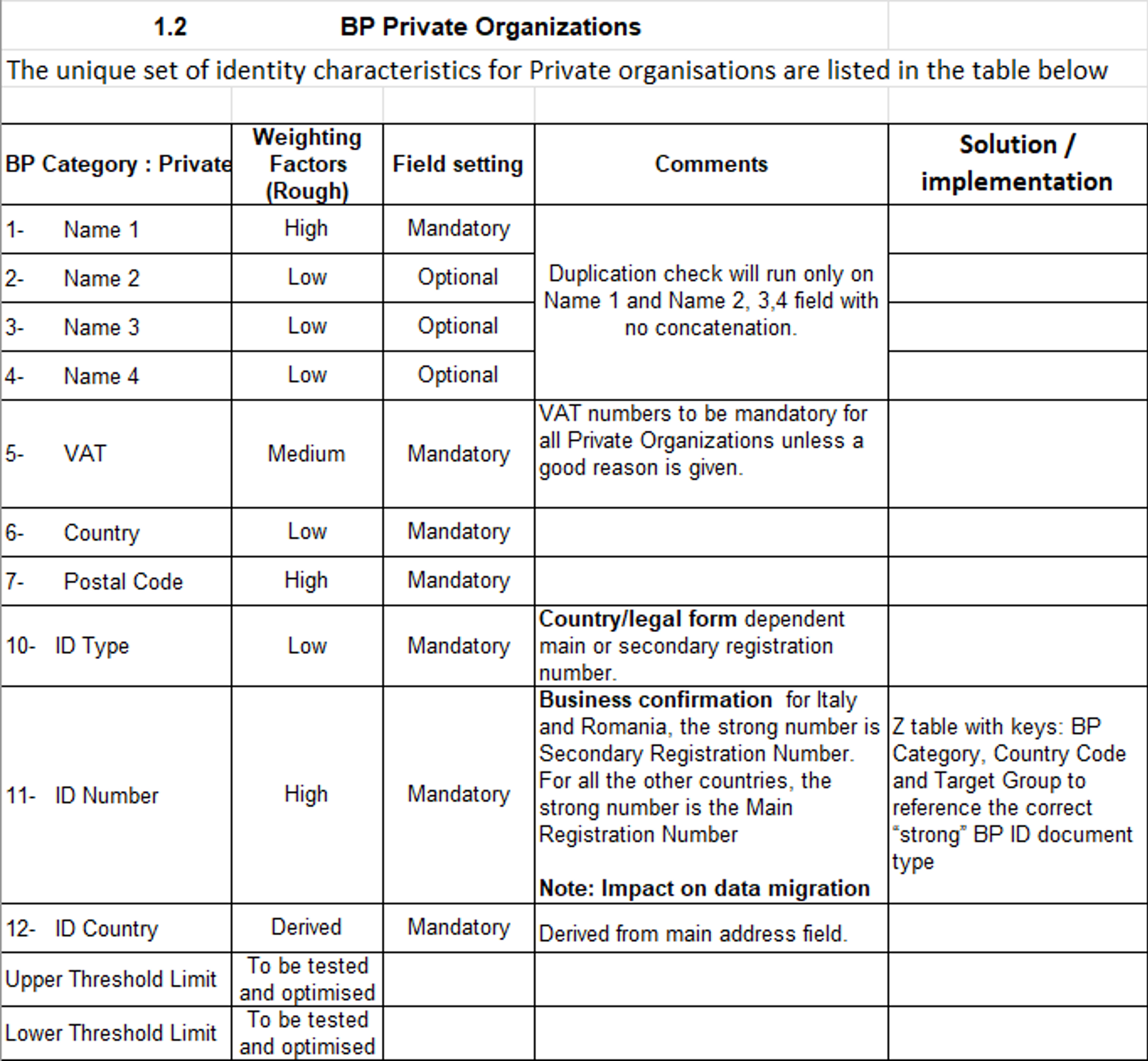In this blog…
In this blog, we will explore how the integration of SAP MDG and SAP GTS can address the challenges faced by global complex manufacturing industries, particularly in maintaining effective export control. We will delve into the benefits of this integration and highlight the crucial role of SAP MDG in ensuring master data quality and compliance across the organization.
SAP GTS manages international trade including regulatory compliance, customs management, supply chain optimisation and business analytics. The legal compliance module can perform fully automated licence checks, as well as SPL (Sanctions Party List) screening of Business Partners through external reference databases.
A headline in the January 2023 edition of Air Force Magazine could scarcely have been more dramatic; “Russian Missiles Used Against Ukraine Absolutely Filled With US Tech.” “According to a British think tank, Russia has various schemes to smuggle technology into the country including front companies in third countries”. Given penalties for violation of US arms control regulations such as ITAR range from a 20-year executive prison sentence to multi-million-dollar fines, or complete cancellation of trading licences, the case for an effective export control system cannot be clearer!
Challenges in Managing Master Data for Export Control in SAP GTS
Consider a giant helicopter manufacturer that buys, sells, manufactures, and maintains tens of thousands of parts (some dual use) with tens of thousands of trading partners across the global supply chain every day. All are subject to a multitude of constantly changing regulations (e.g., ITAR for military parts), sanctions and embargoes.
In the ideal world, the SAP ERP feeder system sends a relevant transaction (e.g., SD sales order item) to SAP GTS where licence determination logic checks for a valid export licence for the combination of product, customer, and countries, and whether the customer and country are on sanctions or embargo “blacklists.” SAP GTS then automatically blocks or releases the ERP sales order and other relevant transactions, and PDF licences can be assigned accordingly. The sales item BOM (bill of material) can also be checked for “sensitive” components and their countries of origin in “re-export scenarios,” or perform “de minimis” calculations to maximise trade preferences. Simple!
Unfortunately, in the real world things are more complex! Lack of global SAP numbering, material description, material classification, business partner name and address standards make slick, fully automated and error-free SAP GTS licence determination or SPL screening logic infeasible. This leads to exposure to an unacceptable level of legal compliance risk through misidentifications, or forces expensive manual workarounds open to human error and fraud whilst at the same time causing critical global supply chain delays. In one case an aircraft manufacturer spent 4 years trying to build a custom unique identification solution for export control before giving up!
Typical SAP GTS master data quality issues include:
- Parts and Product identification errors.
- Parts and Products are subjected to incorrect export/import licensing regulations.
- Missing or incorrect SAP BOM components.
- Incorrect SAP Production Versions or Sales variants.
- ITAR-regulated intangibles (e.g., flight control software or technical documentation) not controlled in SAP!
- Identification of errors with external Business Partners (organisations or natural persons) for GTS legal compliance and SPL screening purposes.
- Identification errors due to duplicate Parts, Products or Business Partners.
- Missing Supplier or Customer legal ownership/shareholder information.
- Missing customs agent, broker, and transport carrier information. Missing or incorrect SAP Partner Type definitions.
- Outdated addresses, corporate registration numbers and other critical unique ID information.
- Inability to query Business Partner SPL fully automatically and risk-free using external reference DBs such as Catalyst Compliance.
- For corporations using SAP ECC and S4 Foreign Trade functionality instead of GTS, missing basic functionality has forced the development of dodgy custom programs or maintenance of non-SAP “shadow” systems as “band-aids” for primary functional defects!
The situation is often exacerbated by the de-centralisation of IT services in multinationals by the Product Division. Example: An Aerospace and Defence giant with Commercial Aircraft, Defence and Space and Helicopter Divisions, where each runs its own worldwide IT environment with a separate set of data standards, if any! When Corporate IT then decides to deploy a central SAP GTS instance to save costs the software needs to be configured to automatically read Parts and Business Partner records sourced from a minimum of 3 ERP feeder systems and a whole variety of SAP identification data standards, if any.
Enhancing Master Data Quality Across the IT Landscape with SAP MDG
SAP MDG Central Governance is a powerful tool to control SAP ERP Materials and Business Partner master data quality across any IT landscape. Customised Change Requests (CRs) maintain records consistently to any corporate data standard. After maintenance records can be replicated in real time to any SAP or non-SAP application. A host of add-ons to boost intelligence and integration capabilities include standard online connectors to external reference Company Information DBs (e.g. D&B or ORBIS), fuzzy matching algorithms for high-performance SAP Materials or SAP Business Partner queries against S4 HANA or ECC central repositories, and templates for maintenance of complex SAP Business Partner hierarchical structures. MDG can be further customised to ensure logical consistency between SAP Material records and other key manufacturing objects such as BOMs and Production Versions and Routings.

Integration Benefits of SAP GTS and SAP MDG
In all scenarios SAP MDG deployment gives SAP GTS the following major benefits: -
- Fully automatic error free identification (e.g., fuzzy matching) of SAP Material and Business Partners by GTS for legal compliance checks.
- Fully automatic error free identification of individual SAP Business Partners during SPL(Sanctions Party List) screening of external reference database blacklists.
- GTS legal compliance risks due to duplicate Material or Business’ Partner records eliminated using SAP MDG fuzzy matching unique identification logic.
- Checks that SAP Material attributes conform to legal classifications.
- Full enrichment of SAP Business Partner hierarchies via connection to external Company Information databases such as Moody’s or ORBIS.
- Custom consistency checks across SAP Materials, BOMs and Production Versions for example to support SAP GTS trade preference (“de minimis” calculations) scenarios and re-export scenarios.
- Automated update of SAP Business Partner status based on SPL screening, credit check and other validation checks. For example, this ensures that Corporate Procurement, Sales, and Finance are immediately informed about newly “blacklisted” Suppliers and that any corresponding invoice payments, good receipts or contract t call off operations can be effectively blocked or released with minimum operational cost and disruption.
- Monitoring and alerts for legal compliance risks where Materials and Business Partner attributes fail to conform to regulatory requirements.
- Integration of SRM and CRM portals such as Ariba and Salesforce so that Sales Prospects, Candidates or Bidders statuses can be properly updated and fully integrated into SAP GTS screening processes.
- An E2E audit trail of Materials or Business Partner master data changes for potential fraud or error.
- Reduction in global supply chain delays and disruption caused by slow or faulty master data management impacting timely allocation and approval of export and import licences for Parts, Products and Services.
- Major reduction in Export Control administration cost and effort.

Integrating SAP GTS with SAP MDG Requires Vision, Expertise, and Planning
As we can see the integration of SAP GTS with MDG can deliver major financial, legal, and operational benefits. However, there are considerable challenges to first overcome:
- Significance of Change: SAP GTS and MDG require significant changes to export control processes, workflows, and data organisation. Executive management will only support change with strong export business cases, and convincing organisational change leadership and planning.
- Expertise Requirements: SAP MDG functional architects require a solid grasp of SAP S4 HANA Materials and Business Partner industry best practices, and data governance best practices to develop optimal designs supported by business stakeholders. Familiarity with the latest SAP MDG and S4 HANA data quality management functionality and architectural best practices is essential. First class intercultural and communication skills are critical in multinational teams to avoid delays and misunderstandings.
- Technical Competence: An effective SAP MDG developer needs not only comprehensive ABAP Development Workbench knowledge but skills in MDGIMG, BRF+, DRF, MDG ABAP Classes, HANA Studio, SMT mapping, NWBC, Fiori, Floorplan Manager, BADIs, standard SAP integration technologies and so on. Without good technical competence build and test progress will be slow, expensive and erratic.
- Business Process Re-engineering: Legacy export control on logistics processes frequently need re-engineering to add maximum value from advanced SAP GTS functionality.
- In a nutshell, there are major export control benefits to be gained from implementing SAP GTS with SAP MDG so that headlines as in Airforce Magazine become a thing of the past. Strong executive vision, leadership and planning supported by the right SAP team of experts is required to make this happen.
Alluvion
Please contact our experts at Alluvion if you would like to have deeper insights into how SAP MDG can boost SAP GTS expert control value.
Many thanks to Collin for writing this blog!
For more information on this topic, please fill in the form below to get in touch with one of our experts!

Wouter Van Peteghem
Managing Partner
With 23 years of experience in SAP, Wouter is now responsible for business development, HR and daily operations at Alluvion.
Featured articles






